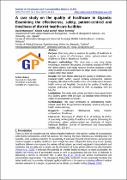A case study on the quality of healthcare in Uganda: Examining the effectiveness, safety, patient-centred and timeliness of district healthcare facilities
Abstract
Purpose: This study aims to examine the quality of healthcare in Uganda in terms of effectiveness, safety, patient-centred and timeliness of District Healthcare Facilities.
Research methodology: This study took a case study design involving an intensive, descriptive, and holistic analysis of PHFs in the Hoima district. Case study research involves studying a single entity in depth so as to understand the larger cases; to describe and explain rather than predict.
Results: The main factors affecting the quality of healthcare were; National health system, overall working environment, national budgetary allocation to the health sector, and collaboration between health centres and hospitals. Enhancing the quality of healthcare requires addressing the aforesaid as well as engaging with the LLGAs.
Limitations: This study only covers one district local government in a country where there are over 100 districts hence limiting the notion of generalization of results.
Contribution: This study contributes to understanding health-related issues from the perspective of quality, which is very key in health service delivery.
Collections
- Research Articles [141]

